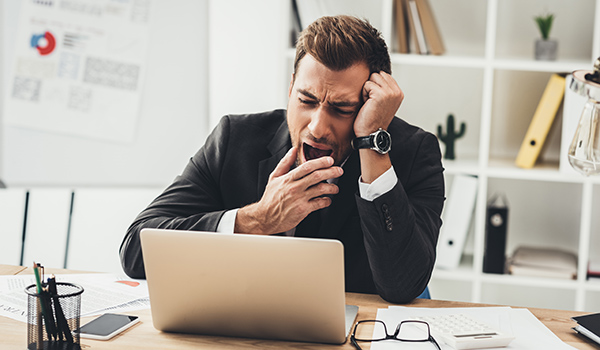
We’ve all been there. Lunch is over and you’re sitting in a presentation trying very hard to focus on the topic at hand but you’re struggling as you are tired at work. Even getting out of your seat after the meeting is a struggle and you tell yourself, tonight is the night you’ll get more sleep. It happens to all of us. But what happens when day after day, you feel tired at work, low on energy and cannot seem to focus at work? And how about that brain fog that you cannot seem to shake all day?
None of this is in your head. The lack of energy you’re feeling at work is a real problem and could be affecting your productivity. Why are we so tired at work and how can we improve our mental alertness and energy throughout the workday?
In this post, we’ll discuss practical steps you can take to increase both of these at work.
How to stop feeling so tired at work
Reduce Screen Time
Most of us sit behind a screen at work every day. In fact, a 2018 study by Nielsen showed that Americans spend 11 hours in front of a screen every single day.
Most people spend 7 hours looking at a computer screen at work. The American Optometric Association (AOA) now has digital eye strain as a real diagnosable condition that arises from staring at so many digital screens throughout the day.
While this area of health research is still developing, there is proof that staring at computer screens for seven hours a day can lead to brain fog, headaches, a lack of focus and decreased energy. But most of us have to depend on our computers for work, so what do we do?
The AOA suggests adopting the 20-20-20 rule. The premise is to take a 20-second break every 20 minutes to look at something 20 feet away. It might also be a good idea to stay off screens during your lunch break and replace it with an alternative activity so you can be recharged for your next half of the day.
Deal with distractions
Another thing that happens with screens is to wander away and enjoy time interacting on social media. While this is not a bad thing per se, it could be affecting your ability to focus.
There is research that suggests that once you interrupt your work and give in to a distraction, including ones on the internet, it can take you 23 minutes to recover and get focused on your work again.
So the more distractions, you give in to, the less you’ll be able to focus and this will decrease your productivity. A concept that can work for you if you tend to get distracted easily is to practice deep work.
The idea is not completely new but Dr. Cal Newport, a professor at Georgetown University, talks about the idea of deep work. These are periods of your day when you focus intensely on your work and then reward yourself with a break once a task is complete.
So for instance, you could decide to set a timer for 1 hour and work intensely on a project. Once that hour of focused work is done, you take a break to reward yourself before you set the timer for another focused hour of work. You might be surprised at how productive and alert you become once you start doing this.
You might also find earplugs useful if you work in a noisy environment.
Get a good night’s sleep
This may seem like a simple rule to follow but according to the CDC, 35% of people don’t get the recommended 7 hours of sleep per night.
Yet this is an essential key to increasing your energy naturally. You can get more sleep by:
- Preparing your mind and body to go to sleep. Adopt a regular night-time routine that trains your brain that you’re getting ready to sleep. This can help you fall asleep faster.
- Don’t take your work home. This is hard to do sometimes but avoid it as much as you can.
- Sleep early. During the workweek, try going to bed earlier than usual.
- Stay away from foods and drinks that keep you up.
- Create an atmosphere conducive for sleep. This tip is especially useful if you’re someone who works at night and thus needs to sleep during the day. Draw the curtains, turn off the lights and put away mobile devices.
- Work on reducing your stress throughout the day. Yes, a certain amount of stress is expected during everyday life. Finding mechanisms that help you cope with stress can help you fall and stay asleep.
Eat a balanced diet
Eating a balanced diet that supplies your body with the right nutrients will also help you stay mentally alert at work.
If you’re low on nutrients like iron, you will feel tired and experience low energy. People who are deficient in vitamin B-12 also tend to experience low energy levels and cannot focus. So make sure you’re eating foods that fuel your body correctly.
On the other hand, there are foods that contain refined sugars that can lower your energy. Avoid those.
Add physical activity to your daily routine
There is enough evidence out there that physical activity increases your energy in addition to helping you maintain a healthy weight. Too busy to incorporate exercise into your daily routine? Check out this post.

